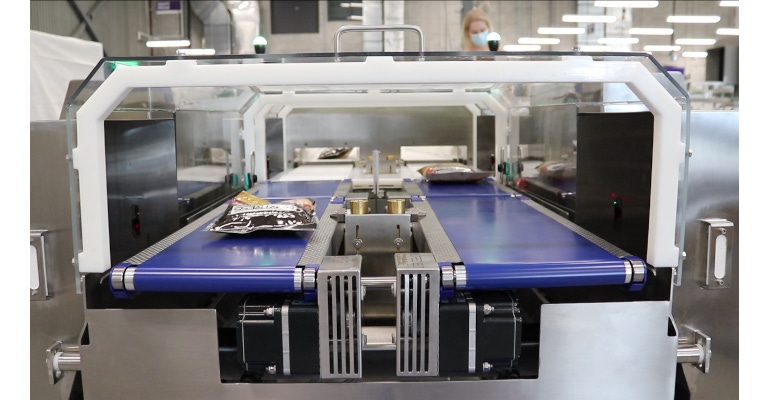Space-saving product inspection breakthrough for world's largest dairy group
January 12, 2022

Fortress Technology has custom-engineered a twin-aperture Stealth metal detector and dual lane Raptor 200 checkweigher for one of the world’s leading premium dairy companies.
Receiving shredded cheese pouches directly from a dual-head bagger, the design unlocks substantial space and cost savings for the busy North American dairy plant.
Offering a customized solution, the twin-lane conveyor configuration consolidates a single metal detector divided into two apertures and two independent weight verification Raptor checkweighers for optimized quality control. Each technology and lane has its own air blast reject mechanism to isolate metal contaminants and weight rejects, helping to reduce and minimize good product being wasted by more than 50%. Measuring just 10 ft long, Fortress also integrated a radius conveyor into the metal detector infeed.
For the producer of iconic cheese brands, compromising on metal detection sensitivity was not an option. “Compared to the alternative multi-lane contaminant detection and combination systems on the market, the high-spec Fortress multi-aperture system was engineered specifically to ensure that that there was no trade-off in terms of performance and metal detection sensitivity,” said Fortress Technology spokesperson Eric Garr. “One of the key benefits of a twin-aperture system is the halving of waste caused by rejects.”
The dual-lane version of Fortress Technology’s multi-aperture metal detector comprises a single unit split into two smaller dedicated apertures for each lane that act as independent metal detectors. For optimal metal detection sensitivity the two compact apertures - measuring 4 in. tall by 10 in. wide - means that the packs pass individually right through the center point of the metal detector.
“With output per hour being the critical productivity benchmark, this game-changing multi-aperture design facilitates high speed and accurate metal detection and marks a step change for lean manufacturers seeking to reduce factory footprint and improve total cost of ownership (TCO),” said Garr.
Multiple Advantages
Fully integrated with the dairy plant’s upstream and downstream equipment and matching the 120-140 ppm output speed of the dual-head VFFS bagging system, the compact geometry of the customized radius conveyor facilitates the positioning and orientation of product packs as they smoothly round the corner towards the metal detector. Providing optimal spacing between product packs as they are presented to each metal detector aperture helps to avoid congestion, bottlenecks, and flexible packaging formats overlapping that could lead to sensitive weight verification checks being distorted.
As each lane is programmed to run independently, the design helps to minimize interruption to the packing process during product switchovers or if one lane stops working or requires maintenance. Additionally, the design gives the plant extra inspection and weight verification capacity, as two different product lines, pack sizes, or SKUs can be run simultaneously adjacent to each other.
Air blast nozzles located between the two outfeed conveyors efficiently and independently remove contaminated product into lockable reject bins equipped with reject confirmation and bin full sensors. “For lighter weight packaged applications like shredded cheese, an air blast reject is the most efficient and has fewer moving parts. Contaminated products are instantly removed off the conveyor belt without disrupting production,” said Garr. With heavier products, Fortress would typically suggest using a pusher or retracting belt mechanism.
Fortress Technology Inc., Scarborough, ON, Canada 416-754-2898 www.fortresstechnology.com
About the Author(s)
You May Also Like





